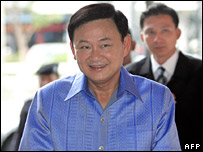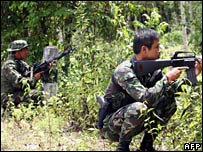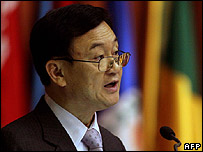Thailand’s capital back to work
The people of Thailand have returned to work less than 36 hours after a military coup ousted Prime Minister Thaksin Shinawatra.
Tanks still patrolled Bangkok’s streets but the military presence was less visible and traffic was busy.
The bloodless coup has been condemned internationally, with the US expressing “disappointment”.
But it has been greeted with relief by many Thais, and appears to have been endorsed by the royal palace. Mr Thaksin, who was at the
http://newsimg.bbc.co.uk/media/images/42111000/jpg/_42111838_democracy_afp_body.jpg
United Nations in New York when the coup took place, has now arrived in Britain.
“I was prime minister when I came [to New York], and I was jobless on the way back,” the Thai News Agency quoted him as saying.
Thai stocks fell by nearly 4% when the market reopened - it had been closed on Wednesday - but soon recovered most of the losses.
Democracy pledge
The coup followed months of growing tension in Thailand, with protests against Mr Thaksin and a general election which was annulled due to concerns about its legitimacy.
The coup’s leader, Gen Sonthi Boonyaratglin, has said he was acting in line with the wishes of the Thai people, blaming government mismanagement.
He has promised to appoint a new prime minister within two weeks, and said the interim government would draft a new constitution with the aim of restoring democracy within a year.
In Bangkok, where Mr Thaksin is unpopular, many people have welcomed the news of the coup.
In the countryside the picture is less certain, as most of Mr Thaksin’s support base is among the rural poor.
Internationally, though, news of the coup has been widely condemned.
White House press secretary Tony Snow said the US was “disappointed”, and added that talks on a US free trade agreement with Thailand depended on a swift return to democracy.
The European Union demanded that the military forces “stand back and give way to the democratically elected political government”.
Rodolfo Severino, the former secretary general of the Asian regional grouping Asean, said the Thai coup “seems to be a step backward in the trend toward institutional processes” in the region.
Media controls
Since taking over, coup leaders have detained Deputy Prime Minister Chitchai Wannasathit and Mr Thaksin’s top aide Prommin Lertsuridej.
http://newsimg.bbc.co.uk/shared/img/o.gif
Other ministers close to the ousted leader have been “invited” to report to the new administration, the coup leaders said in a statement.
Auditor-General Jaruvan Maintaka has also been asked to investigate government corruption, which could lead to the confiscation of Mr Thaksin’s assets.
Thailand is technically under martial law, and the military has banned political gatherings of more than five people and restricted information critical of the coup from being distributed in the media.
Thai media heads have been summoned for a meeting spelling out the new regulations.
The administration “will ask all media to stop broadcasting text messages from viewers and to stop running other expressions of public opinion,” an army official told the French news agency AFP.
According to Thai state TV, Thailand’s revered head of state, King Bhumibol Adulyadej, has given his backing to Gen Sonthi.
The general is believed to be close to the king, although he says the monarch had nothing to do with the actual coup.
The television statement attributed to the king urged all Thais to “remain peaceful” and called for civil servants to listen to orders from Gen Sonthi. Correspondents in Bangkok say securing the endorsement of the 78-year-old monarch is crucial to the success of the military intervention.



